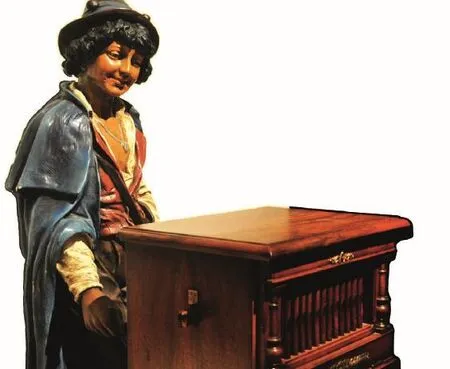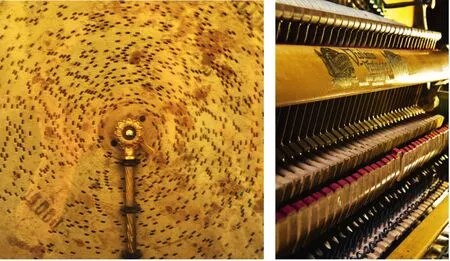MADE IN CHINA
MADE IN CHINA
“In Switzerland they had brotherly love—they had 500 years of democracy and peace, and what did that produce? The cuckoo clock.” So says Harry Lime in the Carol Reed filmThe Third Man, but alongside the famous cuckoo clock, he might easily have added the Swiss music box into the equation.
When Beijing antique dealer Ningyi Zhang began hauling Swiss music boxes over to China, he suspected there would be no shortage of interest. After all, these ornate furniture-sized instruments were great conversation pieces. Their delicate melodies and elaborate construction attract wealthy collectors who are eager for foreign items and to join the nation'snoveau riche.
Zhang, despite little to no experience in musicology, was rightly convinced China's luxury consumers were ready for the music box (八音盒, or eight note box—named for the octatonic scale common in Western music as opposed to China's pentatonic scale). He acquired more than 70 within a few years.
“People are really charmed that these music boxes work without electricity in a world where everything is electronic,” Zhang says. “People are very attracted to things that work with gears, springs, and levers. This is something purely mechanical that can also store great music.”
Zhang's music boxes are decorated with etched wood, dancing porcelain figurines, and some are even coin-operated. In 19th century Europe, train stations, pharmacies, and amusement parks would all have had one, generating revenue thanks to passersby who fancied jamming to polkas and waltzes. Zhang's music boxes had all the fashionable tunes, manifested through the mechanical plucking of violins, the ringing of bells, and the beat of small drums.
Then, there is even the one that plays the iconic Chinese folk song “Mo Li Hua”, or“Jasmine Flower”; watch CCTV's English channel for about an hour and you'll probably hear it somewhere. Here's where the story gets really interesting. Once Zhang thoughthe knew all there was to know about 19th century Swiss artisan manufacturing culture, he acquired a Chinese-themed music box, which went up for auction around the same timeThe New York Timespublished an article that cast light on its fascinating history.
Zhang knew this much: Chinese-themed music boxes were made in small quantities in Switzerland's Jura Valley toward the end of the Qing Dynasty (1616-1911) for export to a small number of Chinese aristocrats. Interest in music boxes from that time followed an obsession with mechanical objects, namely elaborate watches and, of course, clocks, which had been a feature of the Qing era. Emperor Qianlong (乾隆皇帝) notoriously had one of the largest clock collections in the world, many still on display today at the Forbidden City in Beijing. These luxurious time pieces, often gilded and set with gemstones, were gifted to imperial families or traded for porcelain and tea. However, little is known about who, specifically, owned these music boxes.
They were customized for China in almost every aspect, much in the same way Apple unleashed a gold version of their iPhone 5s specifically for wealthy Chinese consumers. No waltzes or polkas this time. Instead, Chinese listeners were granted a number of their own folk songs collected by Frederic “Fritz” Bovet, a member of a Swiss watch-making family, on his travels throughout Asia during the mid-1800s. Bovet recorded ten melodies in China, which included “Mo Li Hua” and “Shi Ba Mo”, also known as “18 Touches” or“Erotic Massage,” a bawdy brothel song, which was banned in China along with brothels when the Communist Party came to power.
“‘Shi Ba Mo' is a bit of a naughty song, and one has to wonder where the Swiss musicologist collected his tunes,” Zhang jokes. The song celebrates a man touching 18 different parts of a woman's body, each touch becoming increasingly intimate, and including lines such as: “I can't touch you there…if I do you will die of bliss.” But regardless of Bovet's personal wanderings, these songs in their form and their significance could have been lost if it wasn't documented in the music box, and for a person who eventually came to possess the music boxes. And, no, it wasn't a Chinese aristocrat.
The New York Timesarticle, penned by American music history professor, W. Anthony Sheppard, revealed to Zhang what makes the music box so valuable. Fast forward to the early 1900s, and Zhang's music box was, Sheppard suggests, sitting in the home of Italian baron Eduardo Fassini-Camossi. Sheppard tells us that the baron, an amateur composer, had likely picked up the music box at a“l(fā)oot auction” held to sell off items pillaged during the Boxer Rebellion (1899-1901), during which Fassini-Camossi had served.

One guest at the baron's house was Italian composer Giacomo Puccini. And a version of“Mo Li Hua” was even appropriated intoTurandot, Puccini's 1926 opera, apparently the result of Fassini-Camossi playing the superior composer the 18th century song from his music box. “Mo Li Hua” was one of the only tunes that survived from pre-1930s China, and in various forms at that. By the time it made it into Puccini's opera, the song had gone through a number of revisions by “intellectuals who had a very specific and nationalistic mindset andwanted to create music for New China,” says Zhang. In what he describes as a “chaotic” time, the melody briefly became the national anthem in 1896. “Shi Ba Mo”, on the other hand, was virtually erased from official memory in China.

Both the inside and outside of these mechanical music boxes are a source of great beauty and happiness for collectors
The appearance of “Mo Li Hua” in Puccini's unfinished final work helped solve the “mystery”surrounding the origins of the music featured in the composer's earlier opera,Madama Butterfly. Set in Japan,Madama Butterflyhad long been thought to contain Japanese songs. During a rather unexpected encounter with the music box at the Murtogh D. Guinness Collection of mechanical musical instruments at New Jersey's Morris Museum, Sheppard discovered otherwise. Here, he found that “Mo Li Hua” and “Shi Ba Mo” sounded undoubtedly similar to the “tinkling”notes in Puccini'sMadama Butterfly. Bovet's thorough transcription helped confirm his suspicions.
“Other surviving Swiss music boxes from the period include these melodies,” Sheppard wrote in a column for the Institute for Advanced Study. “However, the Guinness box crucially preserves its original tune sheet, listing the song titles in nonstandard transliteration and in Chinese characters. Thus, the Guinness box serves as something like a Rosetta Stone for this historical project.”
And so Zhang's music box, formerly part of the Guinness collection, having planted a seed in Western musical culture, has returned to China and is now part of the Poly Auction, and is listed at around three million RMB.
Zhang supposes he'll hold on to the music box so that it can be appreciated a little longer. He has two more on the way, but he has no idea what songs they have in them or what stories they hold.
As for future collectors or possessors of the Chinese music box, he guesses few of them will know much more about their history, but that shouldn't stop a collector. After all, it didn't stop Emperor Qianlong.- JESSICA RAPP (阮潔茜)

